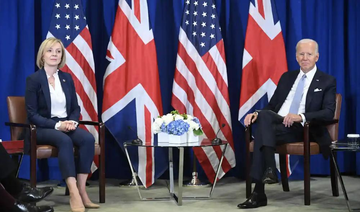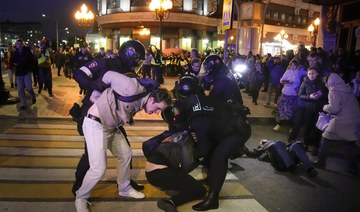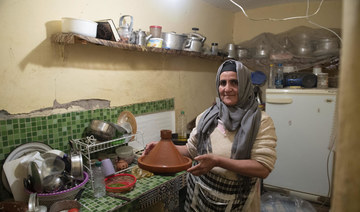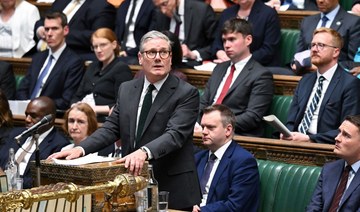NEW YORK CITY: Ukrainian President Volodymyr Zelensky suggested Wednesday that Russia’s decision to mobilize some reservists showed that Moscow isn’t serious about negotiating an end to its nearly seven-month-long war.
Speaking by video to the UN General Assembly meeting of world leaders hours after Russian President Vladimir Putin’s announcement, Zelensky insisted his country would prevail in repelling Russia’s attack and forcing its troops out.
“We can return the Ukrainian flag to our entire territory. We can do it with the force of arms,” the president said. “But we need time.”
Putin’s decree Wednesday about the mobilization was sparse on details. Officials said as many as 300,000 reservists could be tapped. It was apparently an effort to seize momentum after a Ukrainian counteroffensive this month retook swaths of territory that Russians had held.
But the first such call-up in Russia since World War II also brings the fighting home in a new way for Russians and risks fanning domestic anxiety and antipathy toward the war. Shortly after Putin’s announcement, flights out of the country rapidly filled up, and hundreds of people were arrested at antiwar demonstrations across the country.
A day earlier, Russian-controlled parts of eastern and southern Ukraine announced plans for referendums on becoming parts of Russia. Ukrainian leaders and their Western allies consider the votes illegitimate.
Zelensky didn’t discuss the developments in detail. But he suggested any Russian talk of negotiations is only a delaying tactic, and that Moscow’s actions speak louder than its words.
“They talk about the talks but announce military mobilization. They talk about the talks but announce pseudo-referendums in the occupied territories of Ukraine,” he said.
Russia hasn’t yet had its turn to speak at the gathering.
Putin, who is not attending the event, has said he sent his armed forces into Ukraine because of risks to his country’s security from what he considers a hostile government in Kyiv; to liberate Russians living in Ukraine — especially its eastern Donbas region — from what he views as the Ukrainian government’s oppression; and to restore what he considers to be Russia’s historical territorial claims on the country.
Zelensky’s speech was striking not only for its contents but also its context. It took place after the extraordinary mobilization announcement. It was the first time he addressed the world’s leaders gathered together since Russia invaded in February.
It wasn’t delivered at the august rostrum where other presidents, prime ministers and monarchs speak — but instead by video from a nation at war after Zelensky was granted special permission to not come in person.
He appeared as he has in many previous video appearances — in an olive green T-shirt. He sat at a table with a Ukrainian flag behind his right shoulder and large image of the UN flag and Ukraine’s behind his left shoulder.
The leader opined that Moscow wants to spend the winter preparing its forces in Ukraine for a new offensive, or at least preparing fortifications while mobilizing more troops in the largest military conflict in Europe since World War II.
“Russia wants war. It’s true. But Russia will not be able to stop the course of history,” he said, declaring that “mankind and the international law are stronger” than what he called a “terrorist state.”
Laying out various “preconditions for peace” in Ukraine that sometimes reached into broader prescriptions for improving the global order, he urged world leaders to strip Russia of its vote in international institutions and UN Security Council veto, saying that aggressors need to be punished and isolated.
The fighting has already prompted some moves against Russia in UN bodies, after Moscow was able to veto a demand that to stop its attack on Ukraine days after it began.
The veto particularly galled a number of other countries and led to action in the broader General Assembly, where resolutions aren’t binding but there are no vetoes.
The assembly voted overwhelmingly in March to deplore Russia’s aggression against Ukraine, call for an immediate cease-fire and withdrawal of all Russian forces, and urge protection for millions of civilians. The next month, a smaller but still commanding number of members voted to suspend Russia from the UN Human Rights Council.
Zelensky’s speech was one of the most keenly anticipated at a gathering that has dwelled this year on the war in his country. But it wasn’t the first time the first-term president has found himself in the spotlight at the assembly’s annual meeting.
At last year’s General Assembly, Zelensky memorably compared the UN to “a retired superhero who’s long forgotten how great they once were” as he repeated appeals for action to confront Russia over its 2014 annexation of Ukraine’s Crimean peninsula and its support for the separatists.
President Zelensky at UNGA: Russia not serious about ending Ukraine war
https://arab.news/2a29f
President Zelensky at UNGA: Russia not serious about ending Ukraine war
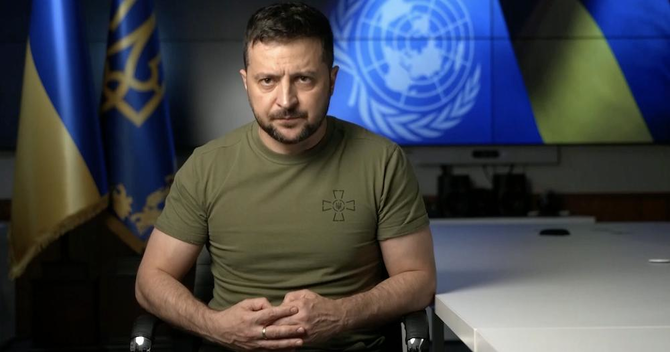
- Zelensky’s speech was striking not only for its contents but also its context
- Putin’s decree Wednesday about the mobilization was sparse on details
Violence mars Mexico vote as country prepares to elect first woman president

- Mexico’s largest-ever elections have also been the most violent in modern history, with the murders of 38 candidates
- The deadly violence has stoked concerns about the threat of warring drug cartels to democracy
MEXICO CITY: Two people were killed in violence at polling centers on Sunday in the midst of Mexico’s historic election expected to make leftist Claudia Sheinbaum, the ruling party candidate, the country’s first woman president.
Voting was suspended at one polling place after a person was killed in a shooting in Coyomeapan, a town in the state of Puebla, the state electoral authority reported in the afternoon. The state attorney general confirmed another death at a polling center in Tlapanala, also in Puebla.
Mexico’s largest-ever elections have also been the most violent in modern history, with the murders of 38 candidates, including a local candidate who was fatally shot on Saturday night. The deadly violence has stoked concerns about the threat of warring drug cartels to democracy.
Sheinbaum, who has led in opinion polls over her main competitor Xochitl Galvez, will be tasked with confronting organized crime violence, if elected. More people were killed during the mandate of outgoing President Andres Manuel Lopez Obrador than during any other administration in Mexico’s modern history.

A victory by either woman would represent a major step for Mexico, a country known for its macho culture. The winner, set to begin a six-year term on Oct. 1.
On her way to vote on Sunday morning, Sheinbaum told journalists it was a “historic day” and that she felt at ease and content.
“Everyone must get out to vote,” Sheinbaum, a physicist and former Mexico City mayor, said on local TV.
Galvez, a senator who represents an opposition coalition comprised of the Institutional Revolutionary Party (PRI), the right-wing PAN and the leftist PRD party, chatted with supporters before casting her ballot early Sunday.
“God is with me,” Galvez said, adding that she was expecting a difficult day.
Lopez Obrador, Sheinbaum’s mentor, greeted supporters and posed for photos as he walked from the presidential palace to vote with his wife.
There were long lines of voters outside polling places, even before they opened at 8 a.m. local time (1400 GMT), with some reports of delayed openings.
“It seems like a dream to me. I never imagined that one day I would vote for a woman,” said 87-year-old Edelmira Montiel, a Sheinbaum supporter in Tlaxcala, Mexico’s smallest state.
“Before we couldn’t even vote, and when you could, it was to vote for the person your husband told you to vote for. Thank God that has changed and I get to live it,” Montiel added.
Almost 100 million Mexicans are eligible to vote in Sunday’s election. Other positions up for grabs include Mexico City’s mayor, eight governorships and both chambers of Congress. About 20,000 elected positions are on ballots, the most in Mexico’s history.
The polls will close at 6 p.m. local time (0000 GMT on Monday). The first official preliminary results are expected late on Sunday.
‘Flooded with blood’
“The country is flooded with blood as a result of so much corruption,” said Rosa Maria Baltazar, 69, a voter in Mexico City’s upper-middle class Del Valle neighborhood. “I wish for a change of government for my country, something for a better life.”
Lopez Obrador has loomed over the campaign, seeking to turn the vote into a referendum on his political agenda. Sheinbaum has rejected opposition claims that she would be a “puppet” of Lopez Obrador, though she has pledged to continue many of his policies including those that have helped Mexico’s poorest.
Polls indicate that Morena, the ruling part of Lopez Obrador and Sheinbaum, is likely to fall short of securing a two-thirds majority in Congress. That would make it more difficult for Sheinbaum to push constitutional reforms past opposition parties, including the
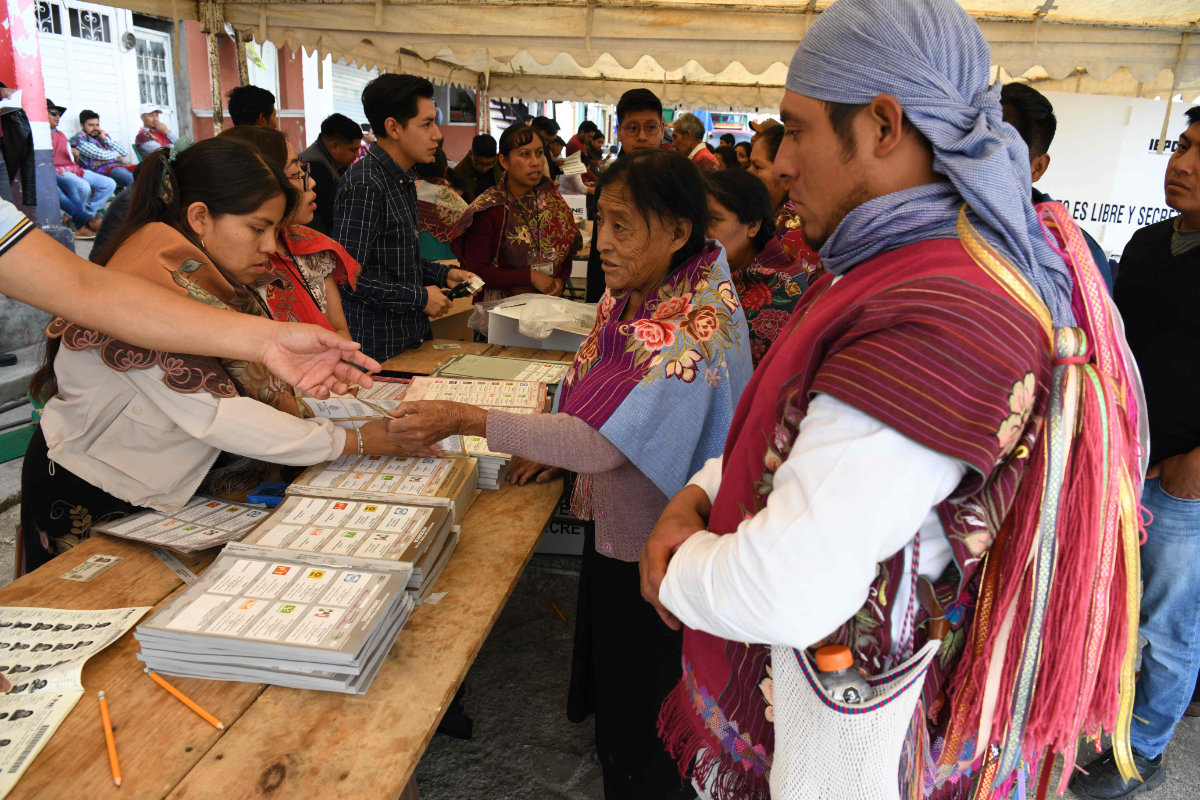
PRI, which ruled Mexico for about seven decades until democratic elections in 2000.
Challenges ahead for the next president also include addressing electricity and water shortages and luring manufacturers to relocate as part of the nearshoring trend, in which companies move supply chains closer to their main markets. The election winner also will have to wrestle with what to do with Pemex, the state oil giant that has seen production decline for two decades and is drowning in debt.
Both candidates have promised to expand welfare programs, though Mexico has a large deficit this year and sluggish GDP growth of just 1.5 percent expected by the central bank next year.
The new president will face tense negotiations with the United States over the huge flows of US-bound migrants crossing Mexico and security cooperation over drug trafficking at a time when the US fentanyl epidemic rages.
Mexican officials expect these negotiations to be more difficult if the US presidency is won by Donald Trump in November. Trump, the first US president to be convicted of a crime, has vowed to impose 100 percent tariffs on Chinese cars made in Mexico and said he would mobilize special forces to fight the cartels.
Sam Castillo, a 25-year-old dancer who lives between Oaxaca state and Mexico City, said he hoped Sheinbaum could be stronger on foreign relations than Lopez Obrador had been.
As he waited to vote at a polling place in the Florida district in the south of Mexico City, he said he felt better with the leftist Morena in power as part of the LGBT community.
“What we have seen with gender legislation, with marriage equality, for me it has to do with party,” Castillo said.
Trump’s attacks on US justice system after his conviction could be used by autocrats, say analysts

- Some autocratic countries reacted swiftly in support of Trump, with Moscow calling it the “elimination of political rivals by all possible legal or illegal means”
- “For Putin it must be perfect because it creates a mess that he can try to seek advantage from,” says a former senior White House national security adviser
After his historic guilty verdict in his hush money case, Donald Trump attacked the US criminal justice system, making unfounded claims of a “rigged” trial that echoed remarks from the Kremlin.
“If they can do this to me, they can do this to anyone,” Trump said Friday, speaking from his namesake tower in New York on Friday. Thousands of miles away, Russian President Vladimir Putin was probably “rubbing his hands with glee,” said Fiona Hill, a former senior White House national security adviser to three US presidents, including Trump.
Hill and other analysts say Trump’s attacks could be useful to Putin and other autocrats as they look to boost their standing among their own citizens, potentially sway the upcoming US presidential election in which Trump is the presumptive Republican nominee, and undermine the United States’ global influence.
Some autocratic countries reacted swiftly in support of Trump.
Moscow agreed with Trump’s assessment of Thursday’s verdict, calling it the “elimination of political rivals by all possible legal or illegal means,” Kremlin spokesman Dmitry Peskov said. In September, Putin said the prosecution of Trump was political revenge that “shows the rottenness of the American political system.”
After the verdict, Hungary’s prime minister, Viktor Orban, called Trump a “man of honor” and urged him to “keep on fighting.”
China’s state-owned Global Times newspaper suggested Trump’s conviction adds to the “farcical nature” of this year’s US presidential election, adding that it will aggravate political extremism and end in “more chaos and social unrest.”
Putin is especially likely to see the latest turmoil as an opportunity, analysts say. He has long sought to widen divisions in Western societies in an attempt to advance a Russian worldview. Since the invasion of Ukraine, and ahead of crucial elections throughout the West this year, Russia has been accused of carrying out multiple attacks of sabotage and of targeting dissidents abroad to stoke anxieties and sow discord.
Moscow was accused of meddling in the 2016 US election that Trump won by creating a troll factory, hacking Hillary Clinton’s campaign, spreading fake news and trying to influence Trump-linked officials.
“What mischief does he have to make when you have people within the American system itself denigrating it and pulling it down?” Hill said of Putin.
Political chaos can benefit autocratic leaders by distracting Washington from key issues, including the war in Ukraine. Russia’s goal is to move voices from the “fringes of the political debate to the mainstream,” said David Salvo, Managing Director of the Alliance for Securing Democracy at the German Marshall Fund in Washington, D.C.
The Kremlin does that partly by pushing Russian points of view under the guise of news and social media posts that look like they originate in the West.
Salvo noted that disagreements in Congress that delayed an aid package to Ukraine followed a Russian social media campaign aimed at Americans. That led to Russia gaining the upper hand on the battlefield.
The attacks on the US justice system from Trump and his allies are “perfect fodder” for another “major propaganda and influence operation,” Hill told The Associated Press, suggesting Russia could target swing voters in battleground states ahead of the November election.
For generations, US presidential administrations have depicted America as a bastion of democracy, free speech and human rights and have encouraged other states to adopt those ideals. But Trump suggested the justice system is being used to persecute him — something that happens in some autocratic countries.
Leaders including Putin “must love” that Trump is criticizing “the key institutions of democracy” in the way autocratic states have done for years as it legitimizes them in the eyes of their own people said Graeme Robertson, a political science professor at the University of North Carolina at Chapel Hill.
Trump sees himself as a “strongman ruler” and looks to Putin for inspiration, Hill said. His attacks encourage any nation — from those with a mild gripe to the openly hostile — to “have their moment to bring down the colossus,” Hill said.
The message to Chinese and Russian citizens watching the drama unfold in the US is that they are better off at home. The message to countries that Russia and China are courting as they attempt to expand their influence in Africa, Asia and Latin America is that Moscow and Beijing can offer more reliable partnerships.
The threat from the “new axis of authoritarians,” including Russia, China, Iran and North Korea is “daunting,” as those states work more closely together with overlapping interests said Matthew Kroenig, a former defense official and vice president at the Atlantic Council’s Scowcroft Center for Strategy and Security.
Moscow in particular, Kroenig said, will likely try to use the political turmoil in the US to divide the NATO security alliance. It could try to turn the public in NATO states against the US by encouraging them to question whether they have “shared values” with Americans, he said. If successful, that could lead to a fundamental reshaping of global security architecture — a goal of Russia and China — since the end of the Cold War.
Some Western governments, meanwhile, are caught in a delicate dance between not wanting to ostracize Trump as a potential next US president and the need to respect the US justice system. Others, such as EU member Hungary, openly court him.
“For Putin it must be perfect because it creates a mess that he can try to seek advantage from,” Hill said.
Magnitude 5.9 earthquake hits central Japan, no tsunami warning

TOKYO: A strong magnitude 5.9 earthquake shook central Japan on Monday but there was no tsunami warning, the Japan Meteorological Agency (JMA) said.
The shallow jolt, which hit at 6:31 am (2131 GMT), was centered in the Noto Peninsula, where a devastating quake on January 1 killed more than 230 people.
Local officials said there were no immediate reports of damage but they were still collecting information, public broadcaster NHK reported.
Monday morning’s earthquake was followed around 10 minutes later by a second, smaller magnitude-4.8 shake in the same area, the JMA said.
The operator of the Kashiwazaki-Kariwa nuclear plant in the region said it had suspended operations to check for damage, according to NHK.
The broadcaster warned that many buildings in the coastal Sea of Japan region might have been previously damaged in the powerful January earthquake and its aftershocks.
The January 1 quake destroyed and toppled buildings, caused fires and knocked out infrastructure on the Noto Peninsula just as families were celebrating New Year’s Day.
Sitting on top of four major tectonic plates along the western edge of the Pacific “Ring of Fire,” Japan is one of the world’s most tectonically active countries.
The archipelago, home to around 125 million people, experiences around 1,500 jolts every year and accounts for around 18 percent of the world’s earthquakes.
The vast majority are mild, although the damage they cause varies according to their location and the depth below the Earth’s surface at which they strike.
Still, even large quakes usually cause little damage thanks to special construction techniques and strict building regulations in the world’s number four economy.
UK’s Starmer seeks to reassure voters on defense with nuclear deterrent pledge

- Keeping our country safe is the bedrock of stability that the British people rightly expect from their government,” Starmer said in a statement
LONDON: British opposition leader Keir Starmer will pledge on Monday to secure the country’s nuclear deterrent, trying to reassure voters before an election that the nation would be safe in the hands of a Labour government.
Describing Labour as the “party of national security,” Starmer will turn his campaign focus to defense, seen as a weak spot for Britain’s main opposition party under his predecessor, Jeremy Corbyn, a long-time supporter of nuclear disarmament.
With conflicts in Ukraine and Gaza, defense is taking center stage before the July 4 election, with Prime Minister Rishi Sunak saying last month that only his Conservative Party could keep voters safe in an increasingly dangerous world.
“National security will always come first in the changed Labour Party I lead. Keeping our country safe is the bedrock of stability that the British people rightly expect from their government,” Starmer said in a statement.
“My message to them is clear: Labour has changed. No longer the party of protest, Labour is the party of national security.”
He will make a commitment to a so-called “nuclear deterrent triple lock” — constructing four new nuclear submarines, maintaining a continuous at-sea deterrent and the delivery of all future upgrades needed for those submarines.
Even though Labour is far ahead in the polls, officials say they still need to convince thousands of undecided voters to back what Starmer repeatedly calls a “changed party,” one which can be trusted on defense, health and tackling immigration.
The Conservatives believe they have a stronger defense offering, with a pledge to increase defense spending to 2.5 percent of GDP a year by 2030 — a target Labour says it wants to match but only when “resources allow.”
Over 100 British celebrities tell Labour leader to halt Israel arms sale

- Sell arms to a country accused grave violations of international law is morally reprehensible, letter says
LONDON: More than 100 British celebrities have urged Labour leader Keir Starmer to "take a stand against the ongoing atrocities committed by Israel" in Gaza, the Guardian reported on Sunday.
Artists for Palestine UK coordinated the joint letter, which urged Starmer, as a former human rights lawyer, to "demonstrate [the UK's] commitment to human rights and international law" by suspending arms sales to Israel if he wins the general election.
Among the musicians, actors, writers, and filmmakers, signatories included comedian Steve Coogan, actor and rapper Riz Ahmed, actresses Miriam Margolyes, Juliet Stevenson, Dame Harriet Walter, Lena Headey and Maxine Peake, singer Paloma Faith, director Mike Leigh, and author Michael Rosen.
“As a former human rights lawyer, you have a unique opportunity to bring about meaningful change by ending UK complicity in war crimes in Gaza,” the letter read. “The UK must no longer remain complicit in the genocide of the Palestinian people.”
It continued: “Continuing to sell arms to a country whose leader is accused of such grave violations of international law is morally reprehensible.”
It comes as UK government ministers announce that they have found “no reason” to suspend weapons exports to Israel after reviewing the most recent three-month period of the Gaza war.
The letter adds to the pressure already exerted on the Labour leader by London mayor Sadiq Khan, Scottish Labour leader Anas Sarwar, and over 50 Labour MPs who have urged that the UK government stop supplying Israel with weapons.
The letter highlighted that over 35,000 Palestinians in Gaza have been “murdered” by Israel since Oct. 7.
A Labour spokesperson told the Guardian: “Labour has repeatedly called on the government to publish at least a summary of the legal advice around arms sales, given our serious concerns over the horrifying scenes in Gaza.
“We have been clear that the government must uphold both our domestic and international legal obligations when it comes to arms exports.
“If Labour wins the election, we will assess the most up-to-date legal advice and we will act on what it says.”



